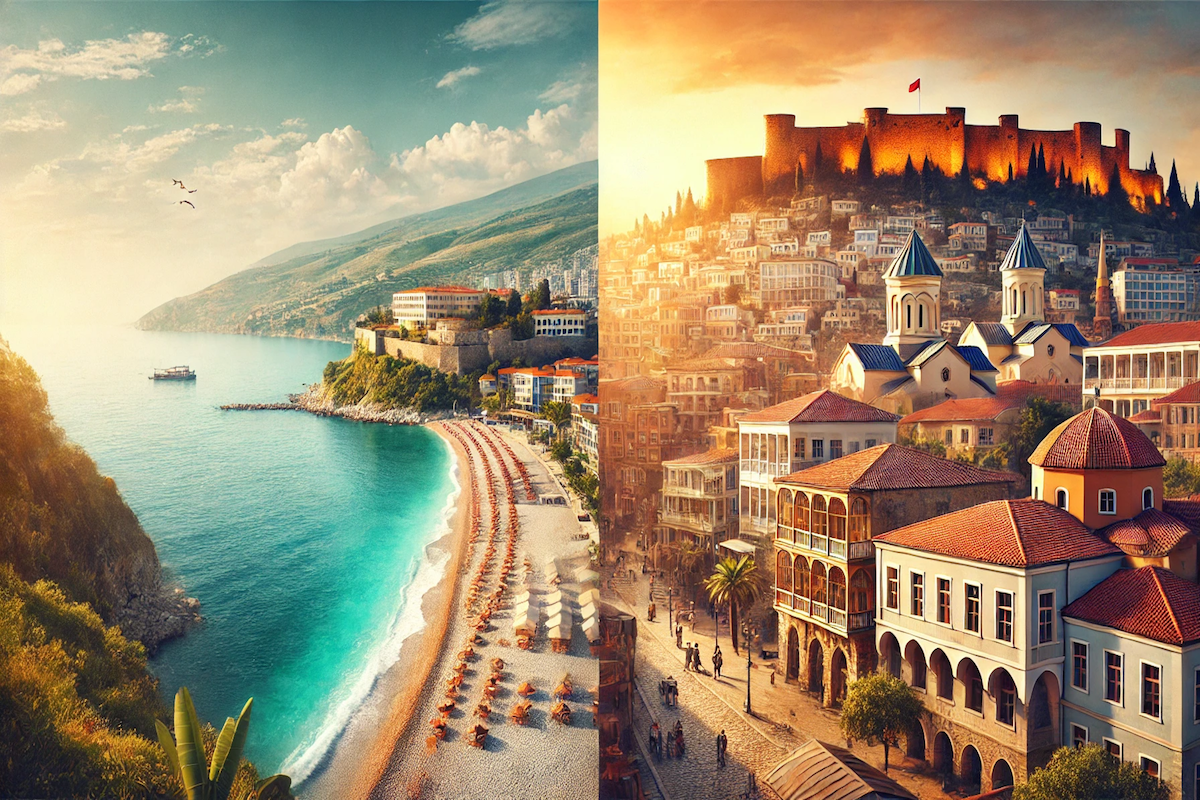Contents
- Discover Your Year of Freedom: Exploring Two European Countries That Welcome Americans Visa-Free!
- Why Visa-Free Living Is the Secret Dream for Americans Abroad
- Saranda’s Off-Season: The Secret Paradise for Writers and Bureaucracy Dodgers
- Georgia: Where Mountains, Food, Wine, and Hospitality Come with a Twist
- Living the Visa-Free Dream: How I Make It Work in Albania and Georgia
- Why Saranda Works for Me (and Why It Doesn’t for Some People)
- How Albania and Georgia Can Ruin You for Ordinary Nomadic Travel
- Why Saranda, Albania, Is the Ultimate Escape from Europe’s 90/180 Visa-Free Shuffle
Discover Your Year of Freedom: Exploring Two European Countries That Welcome Americans Visa-Free!
I’ve Lived in Both! Discover These 2 Visa-Free Gems Where Americans Can Ditch the 90-Day Limit!
Why Visa-Free Living Is the Secret Dream for Americans Abroad
Ninety days. That’s what most European countries offer, and while it sounds generous, it’s barely enough time to unpack your suitcase before you’re scrambling to renew your stay or plan your next move.
When I found out Albania and Georgia let Americans stay visa-free for an entire year, I almost couldn’t believe it.
A whole year without sweating over visa extensions? It felt like winning the expat lottery.
In Georgia, you can immerse yourself in centuries-old winemaking traditions or hike through breathtaking mountains without worrying about overstaying.
And in Albania?
Imagine spending a year soaking up the sun on the Albanian Riviera, all while living for a fraction of what you’d spend in the U.S.
For remote workers, retirees, or anyone tired of watching their life revolve around visa deadlines, these policies are a dream come true.
Compare this to the tight restrictions in most of Europe, where 90 days is standard, and it’s no wonder Americans are flocking to these under-the-radar havens.
Albania and Georgia don’t just offer you a visa-free year, they offer freedom, period.
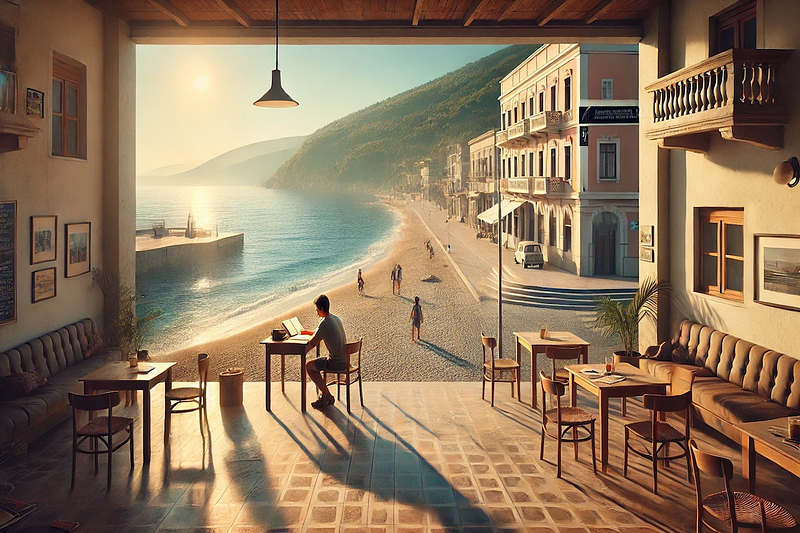
Saranda’s Off-Season: The Secret Paradise for Writers and Bureaucracy Dodgers
My first journey to Saranda didn’t exactly go as planned. The bus from Vlore was supposed to take two and a half hours, but after more stops than I could count and a driver who seemed to think “schedule” was a suggestion, we rolled into Saranda more than four hours later.
Exhausted but hopeful, I checked into a €20-per-night hotel room I’d booked to get my bearings and start apartment hunting.
I’d already put up a post in a local expat Facebook group, asking for leads on rentals.
The responses came flooding in. My cell never pinged so much!
There were plenty of options, but after meeting my Italian landlords for coffee the next morning, I knew I’d found my match.
They didn’t just hand me the keys, they took me on a little tour of Saranda, showing me its quiet charm before driving me to the apartment.
The moment I saw it, I knew, this was home.
I took the place on the spot and have been renting the same apartment every off-season ever since.
Saranda in the off-season is a world apart from its summer chaos though.
About 75% of the businesses are closed, and the streets are practically deserted.
If you’re looking for nightlife or a bustling social scene, this isn’t the place for you.
But for someone like me, who spends most of my time writing and values affordability, stunning views, and peace, it’s been perfect.
At €300 a month, my one-bedroom apartment, with a view of the Ionian Sea that never gets old, fits the bill.
I don’t have to deal with visa-hopping or residency headaches either.
During the summer months, I leave to avoid the crowds, inflated prices, and general madness of peak season.
Come October, I’m back, enjoying the quiet and simplicity of life here.
No bureaucracy, no bullshit, just the kind of calm that lets you breathe.
Sure, it’s not paradise. The off-season can feel like a ghost town, and there are moments when I wish I had more options for dining out or meeting people.
But for what I need, a tranquil spot to write, recharge, and stay in Europe without breaking the bank, it’s hard to imagine a better fit.
Saranda isn’t for everyone, but for me, it’s been exactly what I needed.

Georgia: Where Mountains, Food, Wine, and Hospitality Come with a Twist
After spending 20 years living and working in Ukraine, Georgia seemed like the logical next chapter.
The direct flight from Kyiv was under two hours, and both countries shared post-Soviet roots, although in different stages of development.
Unlike Ukraine, however, Georgia welcomed Americans with an incredibly generous one-year visa upon arrival.
With Russian still widely spoken alongside English, I felt right at home the moment I landed in February 2019.
Georgia seemed almost too good to be true back then. The cost of living was incredibly affordable, rent was a fraction of what you’d pay elsewhere, and the food, oh, the food!
Between the makeshift Georgian bread stalls scattered across every neighborhood, where piping hot loaves are pulled straight from clay pot ovens for just 25 cents, I quickly learned to carry a spare towel or gloves to avoid singeing my fingers on the way home.
Pair that with gooey khachapuri that oozes cheese like it’s on a mission to ruin your diet and the endless glasses of Saperavi wine, and I was sure I’d stumbled into carb-and-wine heaven.
But as they say, life is never about solutions, only trade-offs.
While Georgia’s affordability and warm hospitality were a dream, the country’s quirks soon revealed themselves.
Its odd-hour international flight schedules made it difficult to use as a home base for exploring Europe, and its distance from the rest of the continent added to the challenge.
Still, I stayed for four years, though in hindsight, two years too long.
Some extenuating circumstances made leaving difficult.
First came COVID-19, when Georgia essentially locked itself down for a year and a half.
And, just as things were opening up again, Russia’s invasion of Ukraine in 2022 sent well over 100,000, (some estimates had it at over 200,000) Russians into Georgia, many arriving flush with USD savings.
This influx turned life in Georgia on its head. Rents soared, mine more than doubled, currency rates fluctuated wildly, and inflation hit hard.
The affordability that had initially drawn me to Georgia began to evaporate, making it harder to justify staying.
By December 2022, I decided it was time to move on, but not without appreciating what Georgia had offered me during those years.
Now, as I write this, Georgia has changed yet again. Many of the Russians who drove up prices have moved on or returned home, stabilizing rents and exchange rates.
But with the current political turmoil, marked by protests over election scandals, costs seem to be decreasing even further.
Georgia remains a place where mountains kiss the sky, wine flows endlessly, and hospitality knows no bounds.
The snow-capped peaks of Kazbegi, the ancient streets of Tbilisi, and the Black Sea’s gentle waves in Batumi still hold their magic.
But life here, much like its famous “chacha” (brandy), is an acquired taste, rich, intense, and not without a kick.
Looking back, I’ll always be grateful for the lessons and experiences Georgia gave me, even if it wasn’t the forever home I thought it might be.
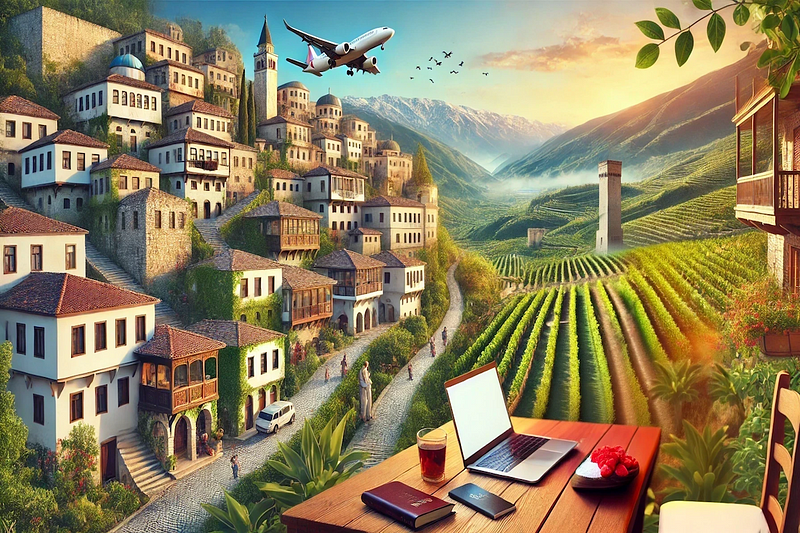
Living the Visa-Free Dream: How I Make It Work in Albania and Georgia
Before I landed in Albania and learned that U.S. citizens get a one-year visa on arrival, I thought, “Perfect!”
But there’s a catch: after that year, you must leave for three months straight before re-entering.
No splitting it up, no creative math. For me, this “forced vacation” fits like a glove.
July, August, and September? The heat is stifling, the crowds overwhelming, and the prices absurd.
You couldn’t pay me to stick around during peak tourist season.
Instead, I use that time to explore nearby countries or head back to the U.S. for family and friends.
Georgia’s visa policy, on the other hand, feels like a cheat code for nomads. Americans also get a one-year visa on arrival, but every time you leave the country, that year resets.
Yes, even if you’re gone for just a day.
The only hitch?
Overstay your year, and you’ll face a fine, not life-altering, but an expense you can easily avoid by staying mindful of your dates.
As for longer stays or residency permits? I haven’t bothered. Harry Browne’s book “How I Found Freedom in an Unfree World” has shaped my approach to living abroad.
Avoiding bureaucracy is a pillar of my lifestyle, and frankly, I’ve never felt the need for the added paperwork.
But if you’re planning to buy property, get a car, or open a bank account, residency might be worth the effort.
Do your research, and decide if the juice is worth the bureaucratic squeeze.
Healthcare in both countries? Surprisingly decent and incredibly affordable.
Most routine issues can be handled out of pocket, and I’ve heard from locals and expats alike that private clinics in both Albania and Georgia offer excellent care, especially dental.
Still, I recommend investing in international health insurance, just in case. Peace of mind is priceless, especially for major issues.
Shop around, though, not all policies are created equal.
Quick tip: Ask locals for healthcare recommendations. Whether it’s a reliable doctor or the best clinic in town, they’ll steer you in the right direction.
And trust me, nothing beats local knowledge when navigating new systems.
In the end, whether you’re soaking in the Albanian Riviera or toasting at a Georgian supra, visa-free living in these two countries is as good as it gets, with a bit of planning and flexibility, of course.
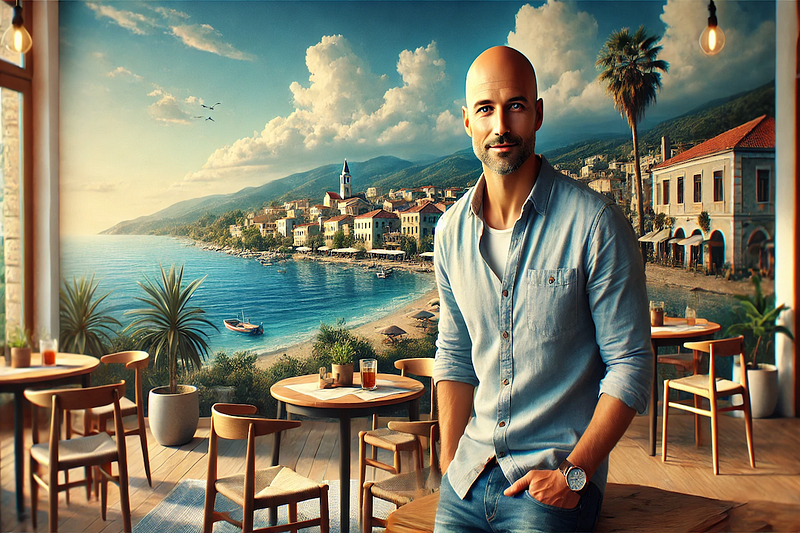
Why Saranda Works for Me (and Why It Doesn’t for Some People)
Living in Saranda for my third off-season has taught me one thing: some people are really good at making themselves miserable.
Not me, though, I came prepared. My country recon, safety precautions, and mind-your-business mantra have kept me enjoying life here.
But oh, the stories I’ve heard from other expats who skipped the homework phase…
Let’s start with the dogs. Saranda has a soft spot for them, and so do the expats, until they don’t.
Take the retired American couple I met who “rescued” a stray dog in their first month.
All was fine until they decided to leave Albania and suddenly realized no airline in the world wanted to ship their unvaccinated, untrained street mutt. “Can someone please adopt him?!” they pleaded in every expat Facebook group. No takers.
Turns out, pawning off your new family isn’t so easy. It’s even worse with cats.
Then there’s the Starbucks crowd. One American woman was beside herself over the lack of her favorite venti pumpkin spice latte.
“Why would they not have Starbucks here? They have one just over there in Corfu, a 30 minute ferry ride away,” she huffed at a café while sipping a cappuccino that cost a third of the price.
I wanted to tell her the stray dogs probably drank it all, but I figured she wouldn’t appreciate the humor.
Oh, and the retired couple again.
The husband, trying to navigate the local butcher, found himself miming “chicken breast” like some kind of chicken charades champion.
The butcher handed him a bag of chicken feet with a grin.
His wife was horrified when he brought them home. “We’re not eating “this”! How can they not understand?” she cried.
Google Translate, folks, it exists for a reason.
But if Wi-Fi complaints were a sport, expats here would win gold.
Add in power cuts, and you’ve got yourself a double event.
“How can I work remotely with the internet cutting out every other hour?” one digital nomad ranted. “And why does the power go out too every time I’m making coffee?”
I didn’t have the heart to tell him about Saranda’s “unique” infrastructure.
Same goes for the tap water, it’s not drinkable, but they sell bottled water everywhere.
Still, some people act like they’ve been personally betrayed when they find out their Brita just doesn’t work here.
And then there are the fireworks. At first, they seem, well, charming, a little pop of festivity in the middle of the night.
But by the fifth random explosion at 3 a.m. on a Tuesday, you start to wonder if you’ve moved to a war zone.
Combine that with taxi drivers charging what I can only assume is the GDP of a small country for a ride to catch your bus out of town, and it’s easy to see why some expats lose their minds.
For me, it’s all part of the adventure. If you don’t like it, you leave, that’s what a passport is for.
But some expats can’t seem to wrap their heads around that concept.
Here’s the thing: Albania, nor Georgia for that matter are perfect, but they’re not trying to be.
You either roll with it or let it roll over you. I mind my own business, respect the culture, and laugh at the quirks.
And if I ever stop enjoying it?
There’s a taxi (overpriced, of course) waiting to take me to catch the next bus out of town. Problem solved.
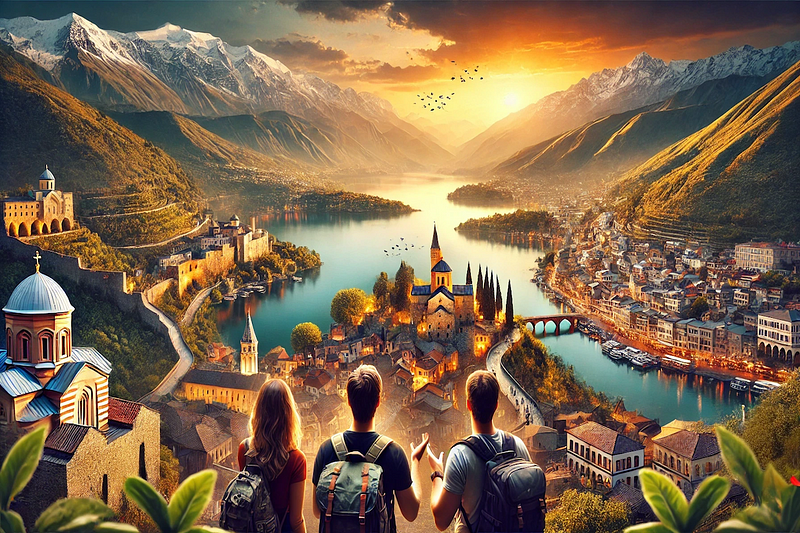
How Albania and Georgia Can Ruin You for Ordinary Nomadic Travel
It’s a crisp November morning in Saranda, and as I sip coffee from my balcony overlooking the glassy Ionian Sea, it hits me, this is my third off-season here, and I can’t imagine being anywhere else.
The tourists are gone, the air is clean, and the supermarket cashier now greets me with a smile that says, “You’re one of us.”
For just a buck, I walk away with a kilo of those irresistible clementines, the tiny ones that practically peel themselves and disappear faster than popcorn during a Netflix binge.
Seriously, they’re like nature’s answer to junk food, but without the guilt.
And, of course, these cheap and tasty citrus delights show up only during the off-season, because Saranda has this uncanny knack for giving you exactly what you never knew you needed, right when you didn’t even know to ask.
This place has a way of sneaking into your heart when you’re too busy being amazed by its charm to notice.
Take the cost of living, for example.
A fresh plate of grilled fish and a seaside view that would cost a fortune on the Amalfi Coast would set you back less than your Netflix subscription.
Sure, the Wi-Fi might cut out mid-Zoom call, but that’s just Saranda’s way of reminding me to take a break and watch the sunset instead.
Georgia, on the other hand, seduces you differently.
My first supra (traditional Georgian feast) wasn’t just a meal, it was a marathon of toasts, laughter, and stories, all orchestrated by a tamada (toastmaster) who could probably moonlight as a stand-up comic.
By the end of the night, I was stuffed with khinkali and convinced I’d accidentally been adopted by a Georgian family.
What makes these countries stand out? Europe’s usual suspects, France, Italy, Spain and now Portugal may offer polished charm, but Albania and Georgia serve up raw, unfiltered authenticity.
In Georgia, I’ve haggled for fresh honey at roadside stalls and gotten directions from strangers who insisted on walking me there.
In Albania, it’s not just ancient ruins that catch your eye, it’s the odd pillbox-style bunkers dotted across the landscape like the country’s quirky freckles.
Built during the paranoia of a bygone era, these concrete mushrooms pop up everywhere: beaches, mountains, even the middle of someone’s farmland.
Exploring them feels like stepping into a Cold War fever dream, and you can’t help but wonder what stories their thick walls could tell, if they weren’t so busy blending into the scenery.
Living here hasn’t just changed my travel habits, it’s changed me.
In Saranda, the first thing you notice is the quiet, an off-season kind of quiet that feels luxurious.
Every morning, I walk the promenade off to the side of me, the Ionian Sea stretches out in swirling blues and greens, looking like Van Gogh himself took a stab at painting waves.
It’s mesmerizing enough to make me forget I was supposed to be answering emails.
Georgia showed me the magic of community, a place where celebrations spill over into the streets, grief is shared with open hearts, and there’s always an extra chair at the table, just in case a stranger or a friend decides to join.
These countries have a way of cracking open your perspective.
They ruin you for anywhere else, not because they’re perfect, but because they show you what’s possible when life is stripped of pretense.
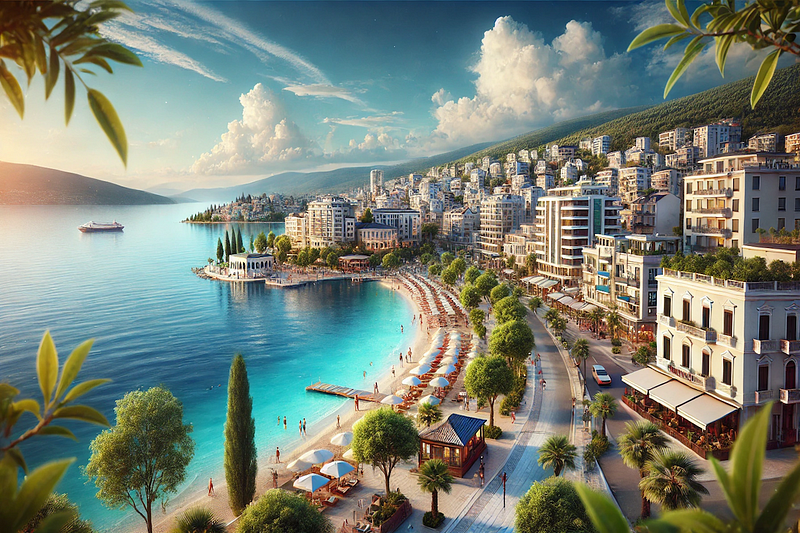
Why Saranda, Albania, Is the Ultimate Escape from Europe’s 90/180 Visa-Free Shuffle
I never thought I’d spend three off-seasons in a tiny Albanian beach town, but here I am, typing this with a view of the Ionian Sea that’s so blue it looks fake.
Saranda has become my winter escape, and honestly, I’m starting to wonder if I’m spoiled for life.
The first thing you notice is the quiet, an off-season kind of quiet that feels luxurious.
The summer crowds are gone, leaving behind locals who greet you like an old friend.
Every morning, I stroll the promenade, fueled by a couple of cups of strong Italian espresso, brewed to perfection with the sleek espresso machine my Italian landlords swore was non-negotiable. “You can’t live without it,” they said.
Turns out, they were right.
Because, well, they’re Italian, and having an espresso machine at home is as essential as having a fridge.
As I walk off the effects of my morning liquid jet fuel, I listen to the waves and catch myself thinking, “Is this real life?”
Renting here is shockingly affordable, especially off-season.
My landlords were all smiles when they realized I was American and could outstay even their European neighbors, thanks to Albania’s generous visa policy. “Long-term discount,” they called it.
But let’s be honest, I also think the real appeal was having a clean, quiet tenant who didn’t smoke, had no kids, pets or would whine about the Wi-Fi cutting out mid-Zoom call and could stay longer than the usual 90 days.
Less turnover meant less cleaning, stable rent, and, best of all, I’d happily vacate for the summer tourist invasion when they could charge four times what I was paying to sunburned vacationers desperate for a sea view.
Win-win!
Speaking of Wi-Fi, it’s about as reliable as an old ATM card, working flawlessly one second, and the next, the machine swallowing it up, leaving you stranded and questioning all your life choices.
After one too many Zoom calls turned into awkward freeze-frame moments, I wised up and got a local SIM card with 4G and enough data to stream an entire season of “Breaking Bad”.
Now, when the Wi-Fi decides to take a holiday, I’m ready to weather those “lapses” like a flexible, seasoned expat.
Food is another story. While some markets do boast some standout gems, those outstanding clementine I boasted about earlier, and olives that taste like they were handpicked from Zeus’s garden, the overall selection can leave you scratching your head.
Restaurants, the ones that remain open in the off-season, can redeem the scene with seafood so fresh it practically flops onto your plate.
It’s a mix of hits and misses, but when the hits land, they’re awesome.
But it’s not all sunshine and olive oil. Although the rainbows can look like they just appeared right out of a Lord of the Rings episode.
The buses, or lack thereof however, can make you question every life choice you’ve ever made.
And Albanian bureaucracy?
Let’s just say from what I’ve heard, is a special kind of adventure, think scavenger hunt, but with paperwork.
Still, Saranda has this magic that keeps pulling me back. It’s not perfect, but it’s perfectly imperfect, and I wouldn’t have it any other way.
How about you?
Could a year in Albania or Georgia change your life?

David Peluchette is a Premium Ghostwriter/Travel and Tech Enthusiast. When David isn’t writing he enjoys traveling, learning new languages, fitness, hiking and going on long walks (did the 550 mile Camino de Santiago, not once but twice!), cooking, eating, reading and building niche websites with WordPress.

